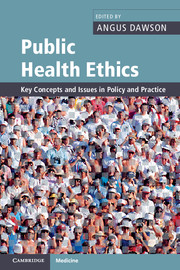Book contents
- Frontmatter
- Contents
- List of contributors
- Preface
- Acknowledgements
- Section 1 Concepts
- Section 2 Issues
- 5 Smoking, health and ethics
- 6 Infectious disease control
- 7 Population screening
- 8 Vaccination ethics
- 9 Environment, ethics and public health
- 10 Public health research ethics
- 11 Equity and population health
- 12 Health inequities
- Index
- References
10 - Public health research ethics
Is non-exploitation the new principle for population-based research ethics?
Published online by Cambridge University Press: 05 July 2011
- Frontmatter
- Contents
- List of contributors
- Preface
- Acknowledgements
- Section 1 Concepts
- Section 2 Issues
- 5 Smoking, health and ethics
- 6 Infectious disease control
- 7 Population screening
- 8 Vaccination ethics
- 9 Environment, ethics and public health
- 10 Public health research ethics
- 11 Equity and population health
- 12 Health inequities
- Index
- References
Summary
Introduction
The ethical principles that should govern public health research must accommodate public health's focus upon the health of populations, as well as the different research methodologies that it tends to use. Whereas biomedical research ethics has tended to emphasize the centrality of consent, research upon populations often raises additional ethical issues and consent may often be insufficient or inappropriate. The Belmont principles of respect for persons, justice and beneficence are intended to cover all biomedical and behavioural research involving human subjects, so should be applicable to public health research. However, because of the population-based focus of public health research work, the scope and application of these principles need to be reconsidered. An additional consideration is whether once their scope and application has been reconfigured, the three Belmont principles are suited to the ethics of public health research. Non-exploitation is a moral concept that has been mooted as an additional principle for biomedical research. Given that a principle of non-exploitation can be readily applied to populations and some unethical public research can be described as exploitative, this would appear at first to be a promising principle for public health research. This chapter will consider the merit of these claims and conclude that the Belmont principles can be interpreted so that they imply that exploitative public health research is wrong.
- Type
- Chapter
- Information
- Public Health EthicsKey Concepts and Issues in Policy and Practice, pp. 174 - 190Publisher: Cambridge University PressPrint publication year: 2011
References
- 2
- Cited by

